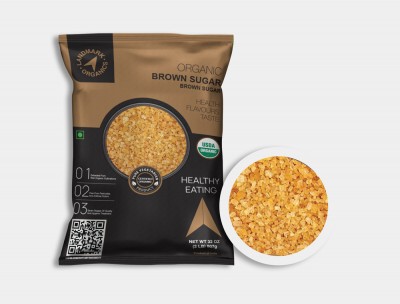Organic brown
sugar, raw sugar or whole cane sugar are sugars that retain a small to large
amount of the molasses from the mother liquor (the partially evaporated sugar
cane juice). Based upon weight, brown cane sugar when fully refined yields up
to 70% white sugar, the degree depending on how much molasses remained in the
sugar crystals, which in turn is dependent upon whether the brown sugar was
centrifuged or not. As there is more molasses in natural brown sugar, it
contains minor nutritional value and mineral content. Some natural brown sugars
have particular names and characteristics, and are sold as turbinado, demerara
or raw sugar if they have been centrifuged to a large degree. Brown sugars that
have been only mildly centrifuged or unrefined (non-centrifuged) retain a much
higher degree of molasses and are called various names across the globe
according to their country of origin: e.g. panela, rapadura, jaggery,
muscovado, piloncillo, etc. are packed with energy and rich in fiber, vitamins,
and minerals.
Although brown sugar has been touted as having health benefits ranging
from soothing menstrual cramps to serving as an anti-aging skin treatment,[8]
there is no nutritional basis to support brown sugar as a healthier alternative
to refined sugars despite the negligible amounts of minerals in brown sugar not
found in white sugar. Turbinado,
demerara and "raw" sugars are made from crystallized, partially
evaporated sugar cane juice and spun in a centrifuge to remove almost all of
the molasses. The sugar crystals are large and golden-colored. This sugar can
be sold as is or sent to the refinery to produce white sugar.
One hundred grams of brown sugar contains 377 Calories (nutrition
table), as opposed to 387 Calories in white sugar (link to nutrition table).
However, brown sugar packs more densely than white sugar due to the smaller
crystal size and may have more calories when measured by volume. Any minerals present in brown sugar come from
the molasses added to the white sugar. In a 100-gram reference amount, brown
sugar contains 15% of the Daily Value for iron, with no other vitamins or
minerals in significant content.
- Brown sugar adds flavor to desserts and baked goods. It can be substituted for maple sugar, and maple sugar can be substituted for it in recipes. Brown sugar caramelizes much more readily than refined sugar, and this effect can be used to make glazes and gravies brown while cooking.
- For domestic purposes one can create the exact equivalent of brown sugar by mixing white sugar with molasses. Suitable proportions are about one tablespoon of molasses to each cup of sugar (one-sixteenth of the total volume). Molasses comprises 10% of brown sugar's total weight, which is about one ninth of the white sugar weight. Due to varying qualities and colors of molasses products, for lighter or darker sugar, reduce or increase its proportion according to taste.
- Brown sugar that has hardened can be made soft again by adding a new source of moisture for the molasses, or by heating and re melting the molasses. Storing brown sugar in a freezer will prevent moisture from escaping and molasses from crystallizing, allowing for a much longer shelf life
- It provides the benefit of strong immunity as per Ayurvedic medicine.
- No cholesterol and trans fat
- Authentic organic products. Free from artificial fertilizers, colors, flavors and preservatives
- We collect the foods directly from the Indian farmers.
- Products are free from chemicals and cultivated under traditional treatment.
- We ensure the purity of this product with vacuum pack or bag and maintenance also make sure that it is free from impurities and contamination.

